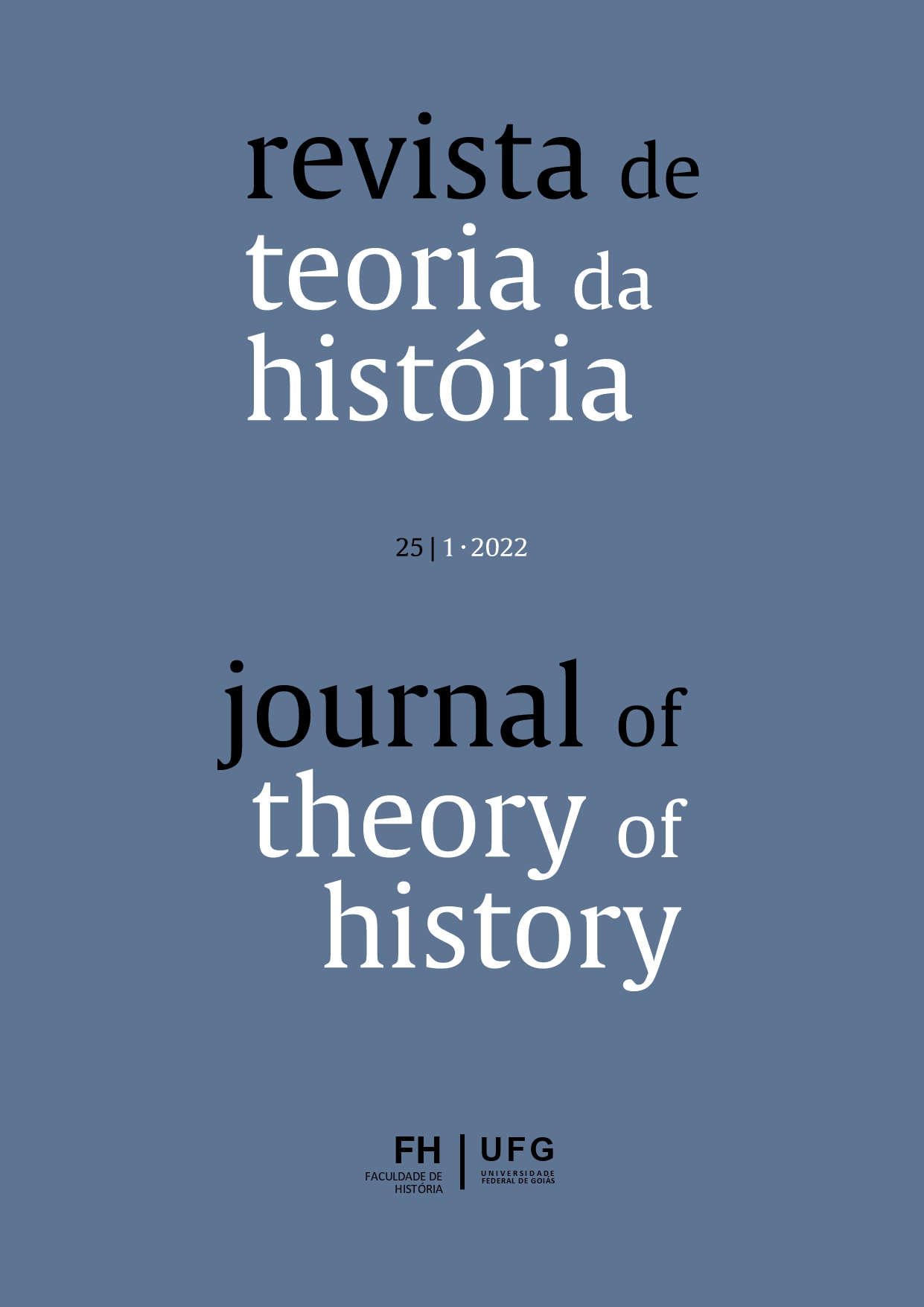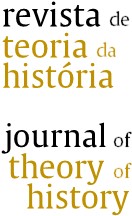Do esquecimento à pacificação e da memória à redenção
Uma leitura de Walter Benjamin
DOI:
https://doi.org/10.5216/rth.v25i1.72278Palavras-chave:
Walter Benjamin, Esquecimento, Memória, Redenção, MonumentoResumo
Esta investigação tem como principal escopo compreender as relações dialécticas entre o esquecimento e a memória. Nesse sentido, procura analisar o fundamento antropológico do esquecimento e as formas do qual se reveste. De modo semelhante, intenta investigar as bases essenciais da memória e a sua ligação a determinados objectos físicos, encarados como meio de revestir uma certa forma de redenção, ou, pelo menos, de libertação das inegáveis energias negativas associadas a qualquer fenómeno de violência.
Referências
BAUR, Michael; ACTON, H. B.. “Marx on Historical Materialism”, s.d https://www.researchgate.net/publication/334446734_Marx_on_Historical_Materialism, consulta 8/6/2020.
BENJAMIN, Walter. O Anjo da História. Edição e Tradução de João Barrento. Lisboa: Assírio & Alvim, 2017.
BENJAMIN, Walter. As passagens de Paris. Edição e Tradução de João Barrento. Lisboa: Assírio & Alvim, 2019.
CASTILLA URBANO, Francisco. Walter Benjamin: Una filosofía de la historia entre la política y la religión. Anuario de Filosofía del Derecho, VIII, pp. 453-471, 1991.
EBADI, Shirin. A Gaiola de Ouro. Lisboa: A Esfera dos Livros, 2009.
Electra, nº 8, Lisboa, Fundação EDP, pp. 31-110, 2019- 2020.
FREUD, Sigmund. Duelo y Melancolía. In: Obras Completas. Vol. 2, Madrid: Ed. Biblioteca Nueva, 2003a.
FREUD, Sigmund. Recuerdo, repetición y elaboración. In: Obras Completas. Vol. 2, Madrid: Ed. Biblioteca Nueva, 2003b.
GUMBRECHT, Hans Ulrich. In 1926: Living at the Edge of Time. Cambridge (Mass.)/London: Harvard University Press, 1997.
GUR-ZE’EV, Ilan. “Walter Benjamin and Max Horkheimer: from Utopia to Redemption”, s.d, www.academia.edu/196504/Walter..., consulta 22/4/2019.
HONESKO, Vinicius Nicastro. O paradigma do tempo. Walter Benjamin e messianismo em Giorgio Agamben. Agon, Revista de Filosofia Política do Direito, Vol. 3, Florianópolis, 2009.
HUXLEY, Aldous. Admirável Mundo Novo. Tradução de Mário Henrique Leiria. Prefácio de Manuel Portela. Lisboa: Antígona, 2013.
KHATIB, Sami. The Time of Capital and the Messianicity of Time. Marx with Benjamin. Studies in Social and Political Tought, Volume 20, 2012.
KHATIB, Sami. The Messianic Without Messianism. Walter Benjamin's Materialist Theology. Anthropology & Materialism, (2013), [Online], 1 | Online since 15 October 2013, connection on 19 April 2019. URL : http://journals.openedition.org/am/159.
KHATIB, Sami. Walter Benjamin and the subject of historical cognition. “Walter Benjamin Unbound”, Special Issue of Annals of Scholarship, Alexander Gelley, Ilka Kressner & Michael G. Levine (eds.), Vol. 21.1, 2015.
KHATIB, Sami. Where the past was, there history shall be. Anthropology & Materialism, 2017, [online], http://journals.openedition.org/am/789, consulta 19/4/2019.
KIDD, William & MURDOCH, Brian. “Introduction”. In: William Kidd e Brian Murdoch (eds.), Memory and Memorials: The Commemorative Century. Aldershot: Ashgate, 2004, 1-9.
KLEIN, Kerwin Lee. On the Emergence of Memory in Historical Discourse. Representations, 69, pp. 127-150, Winter 2000. https://doi.org/10.2307/2902903.
LEIBNIZ, G. W.. Monadologia. Tradução e apresentação de Adelino Cardoso. Lisboa: Edições Colibri, 2016.
MATOS, Sérgio Campos. Consciência Histórica e Nacionalismo (Portugal – Séculos XIX e XX). Lisboa: Livros Horizonte, 2008.
NIETZSCHE, Friedrich. Da utilidade e inconvenientes da história para a vida. Introdução e Tradução de Armando de Morais. Lisboa: Livrolândia, s.da.
NIETZSCHE, Friedrich. O Livro do Filósofo. Porto: Rés Editora, s.db.
NIETZSCHE, Friedrich. Crepúsculo dos Ídolos ou como se filosofa com o martelo. Tradução de Artur Morão. Lisboa: Edições 70, 1985.
NIETZSCHE, Friedrich. A Origem da tragédia. Tradução de Álvaro Ribeiro. Lisboa: Guimarães Editora, 1987.
NIETZSCHE, Friedrich. A Genealogia da Moral. Tradução de Carlos José de Meneses. Lisboa: Guimarães Editores, 1990.
NORA, Pierre. Entre memória e história, a problemática dos lugares. Projeto História, S. Paulo (10), (1993) (Edição original Les lieux de mémoire I, La République, Paris, Gallimard, 1984, pp. XVIII-XLII).
OLIVEIRA, A. Paulo Dias; ARAÚJO, Renata Malcher. Tempo e Modernidade, Espaço e os Paradoxos de Zenão. Revista de Teoria da História, Volume 16, número 2, Universidade Federal de Goiás, 2016.
OLIVEIRA, Luís Filipe. Das memórias de Paio Peres Correia à Crónica do Mestre: os testemunhos portugueses. In: Ayala, Carlos, Fitz, Francisco García, Palacios, J. Santiago (coord.). Memoria y fuentes de la guerra santa peninsular (Siglos X-XV). Gijon: Ediciones Trea, pp. 331-348, 2021.
ORTEGA NARVAEZ, Onasis. Manuel Reyes Mate, Tratado de la Injusticia, Barcelona, Anthropos, 2011, 317 pp.. Praxis Filosófica, Nueva serie, No. 46, (2018).
ORTEGA NARVAEZ, Onasis. Mate, Manuel Reyes, El tiempo tribunal de la historia, Madrid, MD: Trotta, 2018, 176 páginas. Las Torres de Lucca, Vol. 9, nº 17, pp. 347-354, 2020.
ORWELL, George. 1984. Tradução de Ana Luísa Faria. Lisboa: Antígona, 2007.
OSBORNE, Peter; Charles, Matthew. Walter Benjamin. The Stanford Encyclopedia of Philosophy, Edward N. Zalta (ed.), 2019, URL = https://plato.stanford.edu/archives/win2019/entries/benjamin/, consulta 2/7/2020.
POE, Edgar Allan. O jogador de xadrez de Maelzel. Todos os Contos. Tradução de J. Teixeira Aguilar. Lisboa: Temas e Debates, 2014.
QUENTAL, Antero de. Prosas sociopolíticas. Publicadas por Joel Serrão. Lisboa/Angra do Heroísmo : INCM, 1982.
RENAN, Ernest. Qu’est-se qu’une nation (1882). Forest, Philippe (ed.), Qu'est-ce qu'une nation? Littérature et identité nationale de 1871 à 1914. Paris: Pierre Bordas et fils, Éditeur, 1991.
REYES MATE, Manuel. O sofrimento do inocente e a universalidade da Redenção. Cultura, Revista de História e Teoria das Ideias, Vol. XV, II Série, Lisboa, pp. 289-305, 2002.
RICOEUR, Paul, “Memória, história e esquecimento” (versão original “Memory, history, oblivion” In Conferência internacional Haunting Memories? History in Europe after Authoritaranism. Budapeste: 2003).
https://www.uc.pt/fluc/uidief/textos_ricoeur/memoria_historia, consulta2/7/2020.
ROCAFORT, Victor Alonso. Reyes Mate, Medianoche en la historia. Comentarios a las tesis de Walter Benjamin “Sobre el concepto de historia”. Editorial Trotta, Madrid, 2006, 338 páginas”. Foro Interno, 6, pp. 173-242, 2006
ROSS, Alison. Walter Benjamin’s concept of Image. New York / London: Routledge, 2015.
SARGEANT, Maggie. Memory, distortion and the war in German popular culture: the case of Konsalik. In: William Kidd e Brian Murdoch (eds.), Memory and Memorials: The Comemorative Century. Aldershot: Ashgate, 2004, 195-205.
SIMÓN, César Rina. The public use of the past and the position of historian. Newsletter of the Academy of Yuste, nº 06, 2020.
TREPPER, Leopold. O grande jogo da espionagem. Lisboa: Portugália, 2009 [edição original: Le grand jeu, 1975].
WOLFF, Jonathan. 4. Theory of History: "Karl Marx". The Stanford Encyclopedia of Philosophy, 2017, Edward N. Zalta (ed.), URL = <https://plato.stanford.edu/archives/win2017/entries/marx/>, consulta 8/6/2020.
Downloads
Publicado
Como Citar
Edição
Seção
Licença
Copyright (c) 2022 rth |

Este trabalho está licenciado sob uma licença Creative Commons Attribution-NonCommercial-NoDerivatives 4.0 International License.
A Revista publica única e exclusivamente artigos inéditos. São reservados à Revista todos os direitos de veiculação e publicação dos artigos presentes no periódico.
Licensed under a Creative Commons Attribution-NonCommercial-NoDerivatives 4.0 International License



